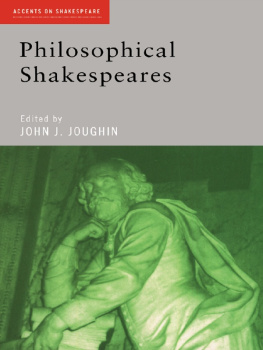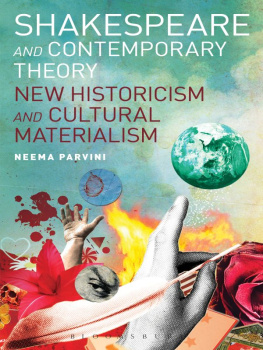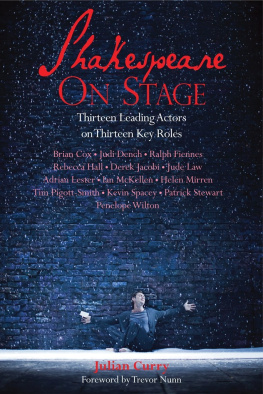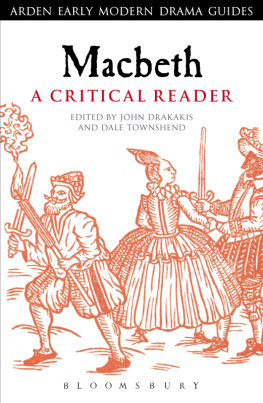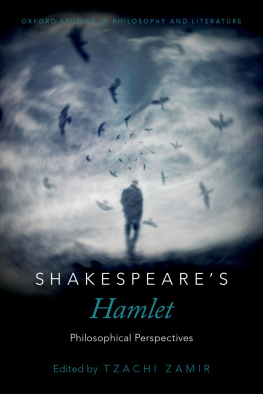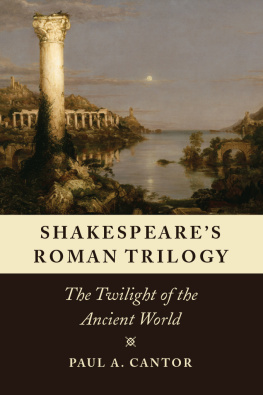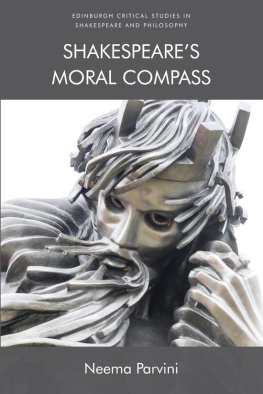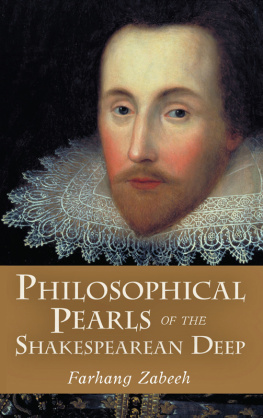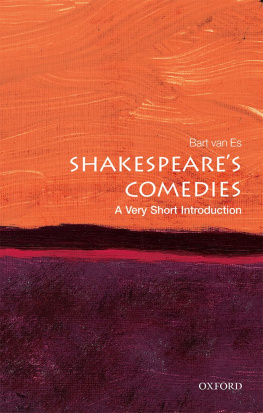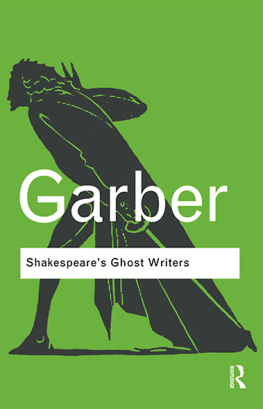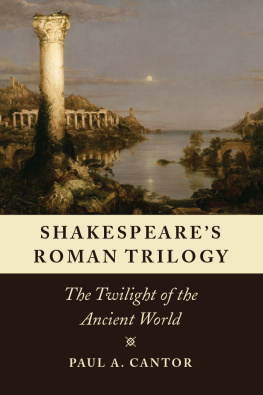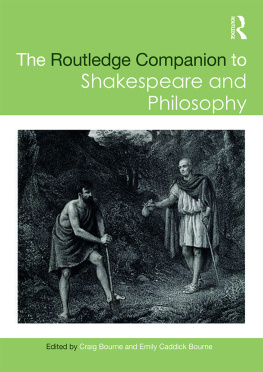
First published 2000
by Routledge
11 New Fetter Lane, London EC4P 4EE
This edition published in the Taylor & Francis e-Library, 2005.
To purchase your own copy of this or any of Taylor & Francis or Routledges collection of thousands of eBooks please go to www.eBookstore.tandf.co.uk.
Simultaneously published in the USA and Canada
by Routledge
29 West 35th Street, New York, NY 10001
Routledge is an imprint of the Taylor & Francis Group
2000 Selection and editorial matter, John J. Joughin; individual chapters, the respective contributors
All rights reserved. No part of this book may be reprinted or reproduced or utilized in any form or by any electronic, mechanical, or other means, now known or hereafter invented, including photocopying and recording, or in any information storage or retrieval system, without permission in writing from the publishers.
British Library Cataloguing in Publication Data
A catalogue record for this book is available from the British Library
Library of Congress Cataloguing in Publication Data
A catalog record for this book has been applied for
ISBN 0-203-40038-0 Master e-book ISBN
ISBN 0-203-40081-X (Adobe eReader Format)
ISBN 0-415-17388-4 (hbk)
ISBN 0-415-17389-2 (pbk)
ACCENTS ON SHAKESPEARE
General editor: TERENCE HAWKES
Philosophical Shakespeares
Shakespeare continues to articulate the central problems of our intellectual inheritance. The plays of this Renaissance playwright still seem to be fundamental to our understanding and experience of modernity.
Key philosophical questions concerning value and meaning continue to resonate in Shakespeares work. In the course of rethinking these issues, Philosophical Shakespeares actively encourages the growing dissolution of boundaries between literature and philosophy. The approach throughout is interdisciplinary; and ranges from problem-centred readings of particular plays to more general elaborations on the significance of Shakespeare in relation to individual thinkers or philosophical traditions.
Contributors: Michael D.Bristol, Stanley Cavell, Howard Caygill, Linda Charnes, Hugh Grady, David Johnson, John J.Joughin, Scott Wilson.
John J.Joughin is Senior Lecturer in English at the University of Central Lancashire. He is the editor of Shakespeare and National Culture (1997).
ACCENTS ON SHAKESPEARE
General Editor: TERENCE HAWKES
It is more than twenty years since the New Accents series helped to establish theory as a fundamental and continuing feature of the study of literature at undergraduate level. Since then, the need for short, powerful cutting edge accounts of and comments on new developments has increased sharply. In the case of Shakespeare, books with this sort of focus have not been readily available. Accents on Shakespeare aims to supply them.
Accents on Shakespeare volumes will either apply theory, or broaden and adapt it in order to connect with concrete teaching concerns. In the process, they will also reflect and engage with the major developments in Shakespeare studies of the last ten years.
The series will lead as well as follow. In pursuit of this goal it will be a two-tiered series. In addition to affordable, adoptable titles aimed at modular undergraduate courses, it will include a number of research-based books. Spirited and committed, these second-tier volumes advocate radical change rather than stolidly reinforcing the status quo.
IN THE SAME SERIES
Shakespeare and Appropriation
Edited by Christy Desmet and Robert Sawyer
Shakespeare Without Women
Dympna Callaghan
Philosophical Shakespeares
Edited by John J.Joughin
In memory of Francis Barker
19521999
Contributors
Michael D.Bristol Professor of English, McGill University, Montral
Stanley Cavell Walter M.Cabot Professor of Aesthetics and the Theory of Value, Harvard University
Howard Caygill Professor of Cultural History, Goldsmiths College, University of London
Linda Charnes Associate Professor of English, Indiana University, Bloomington
Hugh Grady Professor of English, Beaver College, Pennsylvania
David Johnson Lecturer in Literature, The Open University, Milton Keynes
John J.Joughin Senior Lecturer in English, University of Central Lancashire, Preston
Scott Wilson Senior Lecturer in English, Lancaster University
Bibliographical note
Fuller references to works mentioned throughout the volume are appended in the Bibliography.
References to Shakespeares texts throughout are to the Arden editions of individual plays unless otherwise indicated.
General editors preface
In our century, the field of literary studies has rarely been a settled, tranquil place. Indeed, for over two decades, the clash of opposed theories, prejudices and points of view has made it more of a battlefield. Echoing across its most beleaguered terrain, the students weary complaint Why cant I just pick up Shakespeares plays and read them? seems to demand a sympathetic response.
Nevertheless, we know that modern spectacles will always impose their own particular characteristics on the vision of those who unthinkingly don them. This must mean, at the very least, that an apparently simple confrontation with, or pious contemplation of, the text of a 400-year-old play can scarcely supply the grounding for an adequate response to its complex demands. For this reason, a transfer of emphasis from text towards context has increasingly been the concern of critics and scholars since World War II: a tendency that has perhaps reached its climax in more recent movements such as New Historicism or Cultural Materialism.
A consideration of the conditionssocial, political, or economicwithin which the play came to exist, from which it derives, and to which it speaks will certainly make legitimate demands on the attention of any well-prepared student nowadays. Of course, the serious pursuit of those interests will also inevitably start to undermine ancient and inherited prejudices, such as the supposed distinction between foreground and background in literary studies. And even the slightest awareness of the pressures of gender or of race, or the most cursory glance at the role played by that strange creature Shakespeare in our cultural politics, will reinforce a similar turn towards questions that sometimes appear scandalously nonliterary. It seems clear that very different and unsettling notions of the ways in which literature might be addressed can hardly be avoided. The worrying truth is that nobody can just pick up Shakespeares plays and read them. Perhapseven more worryingthey never could.
The aim of Accents on Shakespeare is to encourage students and teachers to explore the implications of this situation by means of an engagement with the major developments in Shakespeare studies over recent years. It will offer a continuing and challenging reflection on those ideas through a series of multi-and single-author books which will also supply the basis for adapting or augmenting them in the light of changing concerns.
Accents on Shakespeare also intends to lead as well as follow. In pursuit of this goal, the series will operate on more than one level. In addition to titles aimed at modular undergraduate courses, it will include a number of books embodying polemical, strongly argued cases aimed at expanding the horizons of a specific aspect of the subject and at challenging the preconceptions on which it is based. These volumes will not be learned monographs in any traditional sense. They will, it is hoped, offer a platform for the work of the liveliest younger scholars and teachers at their most outspoken and provocative. Committed and contentious, they will be reporting from the forefront of current critical activity and will have something new to say. The fact that each book in the series promises a Shakespeare inflected in terms of a specific urgency should ensure that, in the present as in the recent past, the accent will be on change.

